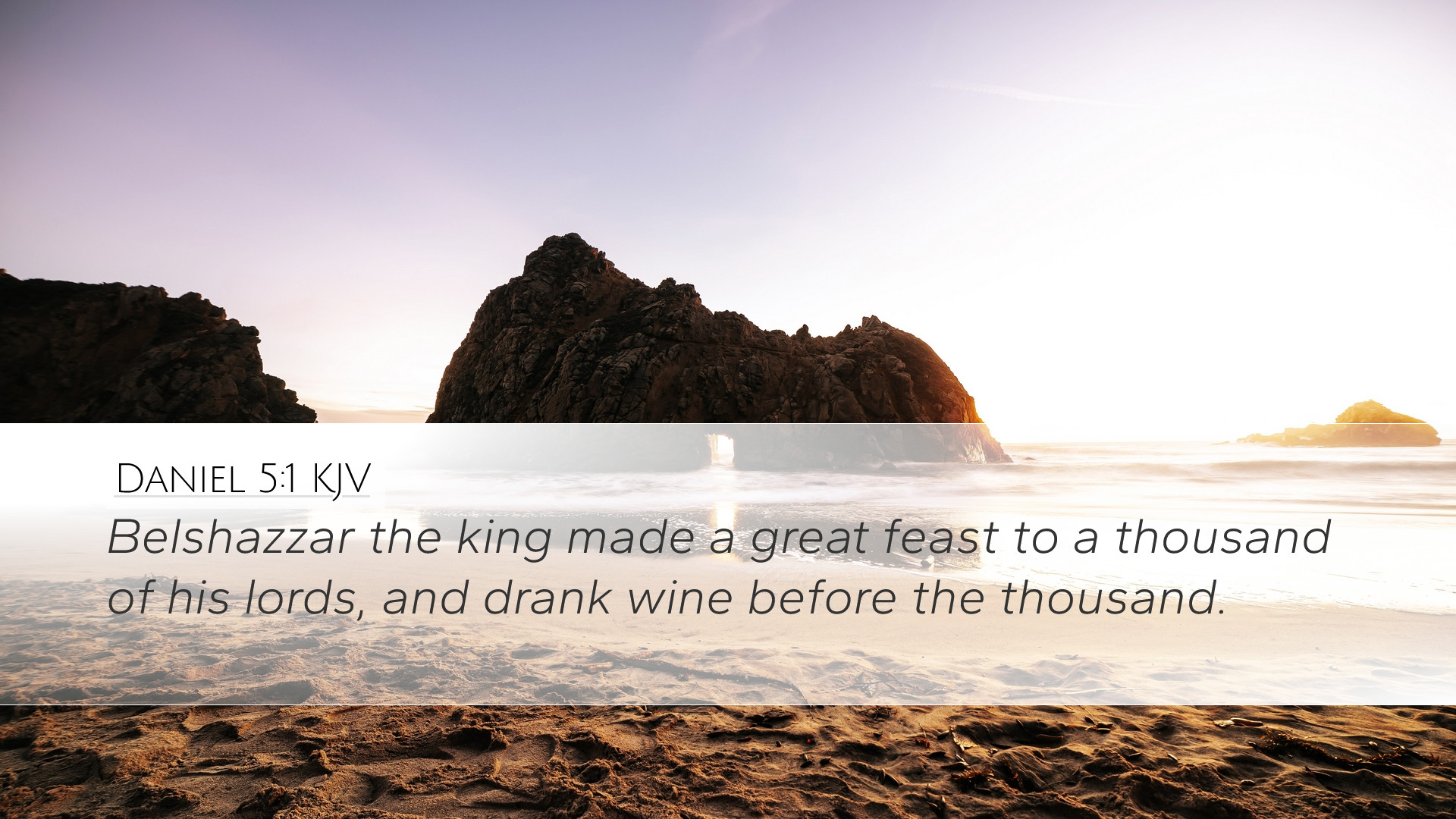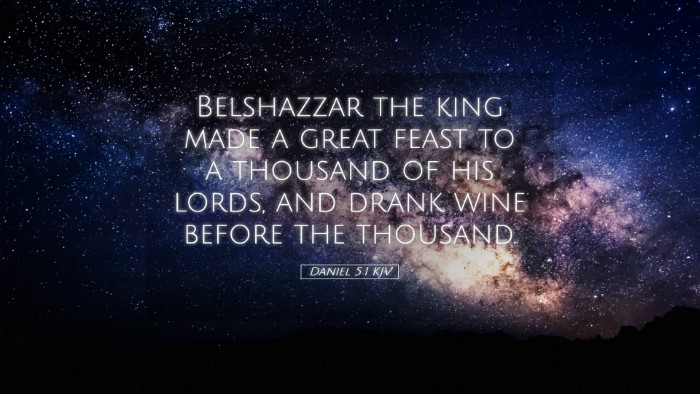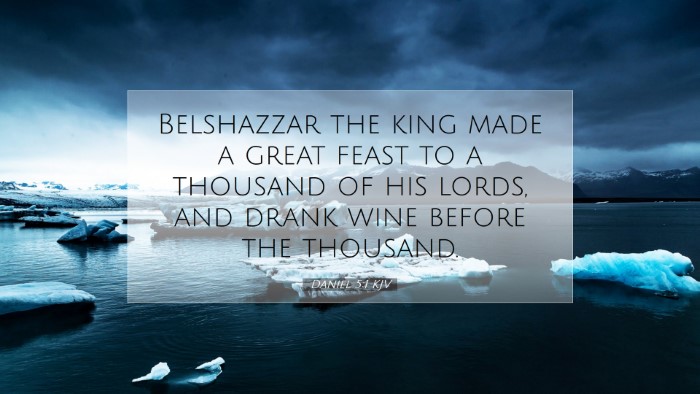Commentary on Daniel 5:1
Daniel 5:1 states: "Belshazzar the king made a great feast to a thousand of his lords, and drank wine before the thousand."
Introduction
This verse introduces a pivotal moment in the Book of Daniel, where we witness the excesses of Belshazzar’s reign, setting the stage for one of the most dramatic divine judgments in Scripture. The verse encapsulates themes of pride, arrogance, and the consequences of forsaking God.
The Historical Context
Belshazzar, as the grandson of Nebuchadnezzar, ruled as co-regent of Babylon. This feast is not merely a royal banquet; it carries profound implications for both the political and spiritual state of Babylon.
-
Political Context:
Belshazzar's reign occurred during a turbulent period for Babylon, especially with rising threats from the Medes and Persians. This feast may have been an attempt to display power and unity among the nobles of his kingdom.
-
Spiritual Context:
It is essential to recognize that this event happens against the backdrop of the Babylonian captivity of the Israelites, where God's judgment is already evident in the previous chapters of Daniel. Belshazzar's acts of defiance against God and His chosen people will culminate in divine retribution.
Commentary Insights
Matthew Henry’s Commentary
Matthew Henry views this verse as reflective of the moral corruption and decadence prevalent in Babylonian society. He emphasizes the contrast between Belshazzar's arrogance and the solemnity usually associated with feasts in ancient cultures, indicating a lack of reverence for God.
-
Feasting and Idolatry:
Henry suggests that the revelry is not simply a celebration, but an act of idolatry, where Belshazzar disregards the divine sovereignty that governed his grandfather’s reign. In his intoxication, he forgets the lessons of history.
-
Symbol of Judgment:
The opulence of the feast also serves as a symbol of impending judgment. It is a stark reminder that indulgence often precedes a fall, as God’s patience comes to an end.
Albert Barnes’ Notes
Albert Barnes elaborates on the implications of the large number of lords present at the banquet. He interprets the gathering as a manifestation of Belshazzar’s desperate attempt to consolidate power amidst perceived threats.
-
Show of Strength:
This feast can be seen as both a social and political maneuver to reinforce loyalty and suppress dissent. Barnes notes that by inviting a thousand lords, Belshazzar effectively showcased his authority, yet this act of bravado belied the fragility of his reign.
-
Divine Warning Ignored:
Barnes highlights that prior warnings from God, including those experienced by Nebuchadnezzar, seem forgotten by Belshazzar. His actions exemplify a blatant disregard for divine caution, leading to his eventual downfall.
Adam Clarke’s Commentary
Adam Clarke offers a detailed observation on the nature of the feast itself. He notes that drinking wine in excess during a feast was associated with various pagan rituals, indicating that Belshazzar’s intentions may have included a tribute to false gods.
-
Cultic Practices:
Clarke connects the royal feast to religious practices of the time, elaborating on how feasts were often accompanied by idolatrous acts. This adds a layer of sacrilege to the banquet, indicating Belshazzar’s complete moral and spiritual depravity.
-
Consequences of Excess:
He also points out that the spirit of excess is inherently toxic, leading to moral decay. Clarke contrasts the king’s celebration with the sobriety that should accompany leadership, noting that such excess led to his ultimate downfall.
Theological Reflections
From a theological perspective, Daniel 5:1 invites us to consider the relationship between earthly power and divine authority. Belshazzar’s feast symbolizes a worldview detached from the accountability that comes from recognizing God’s sovereignty.
-
Pride Before the Fall:
This verse serves as a cautionary tale for leaders and believers alike. The moment one elevates oneself above accountability to God is often the prelude to judgment.
-
God’s Sovereignty:
Furthermore, it emphasizes that earthly kingdoms are ultimately under God’s dominion. Belshazzar’s feast is a stark reminder that divine justice prevails; no matter how powerful one may feel.
Conclusion
In conclusion, Daniel 5:1 serves as a rich text for study and reflection. The insights from commentaries by Matthew Henry, Albert Barnes, and Adam Clarke collectively signal the gravity of Belshazzar’s actions, reflecting a broader moral and spiritual crisis in leadership. For pastors, students, theologians, and Bible scholars, this verse and its commentary prompt a deep exploration of the implications of leadership, accountability to God, and the ever-present reality of divine judgment.


